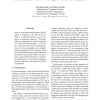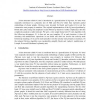745 search results - page 16 / 149 » The origins of combinatorics on words |
134
click to vote
ACL
2007
15 years 3 months ago
2007
When a word sense disambiguation (WSD) system is trained on one domain but applied to a different domain, a drop in accuracy is frequently observed. This highlights the importance...
LREC
2008
15 years 3 months ago
2008
A new approach to handle unknown words in machine translation is presented. The basic idea is to find definitions for the unknown words on the source language side and translate t...
NAACL
2003
15 years 2 months ago
2003
A pseudoword is a composite comprised of two or more words chosen at random; the individual occurrences of the original words within a text are replaced by their conflation. Pseu...
COCOON
2001
Springer
15 years 6 months ago
2001
Springer
A data structure called PC-tree is introduced as a generalization of PQ-trees. PC-trees were originally introduced in a planarity test of Shih and Hsu [7] where they represent par...
115
click to vote
IALP
2010
14 years 11 months ago
2010
Inflection and derivation have been the main ways of creating new words in English. With the development of science and technology, words as such appear faster than ever in scient...


